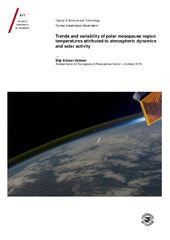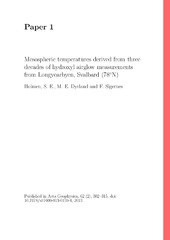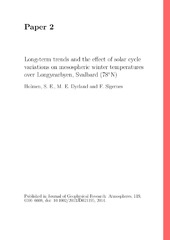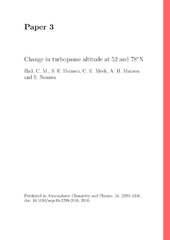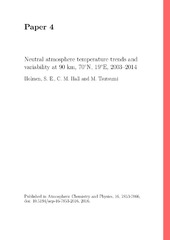| dc.contributor.advisor | Hall, Chris | |
| dc.contributor.author | Holmen, Silje Eriksen | |
| dc.date.accessioned | 2017-03-16T13:53:53Z | |
| dc.date.available | 2017-03-16T13:53:53Z | |
| dc.date.issued | 2016-12-19 | |
| dc.description.abstract | The mesopause region can be considered a "boundary region" between the neutral atmosphere, where atmospheric constituents and momentum are transported mainly by winds and turbulent eddies, and the ionosphere, where the main transport mechanism is molecular diffusion. In the mesopause, complex interactions between dynamics and photochemistry occur, and we are far from a complete understanding of these interactions.
This thesis aims to better understand the processes responsible for the large temperature fluctuations we observe in the polar mesopause region, especially the effects of atmospheric circulation and wave activity from lower atmospheric layers. Investigations of trends have also been conducted. To carry out these investigations, we have derived and examined mesopause temperatures from two high-latitude locations: Tromsø (70°N, 19°E) and Longyearbyen (78°N, 16°E), and turbopause height only from Tromsø. A long-term change in turbopause height may be important for understanding processes that are responsible for redistribution of atmospheric constituents.
We examined winter season variations in the hydroxyl (OH*) airglow temperature record from Longyearbyen and identified local temperature maxima in mid-January and mid-February, as well as a minimum in the transition between December and January. We also identified a number of statistically significant periodic oscillations in temperatures derived from the Nippon/Norway Tromsø Meteor Radar, with periods ranging from 9 days to a year. The seasonal variation showed higher temperatures and variability during winter compared to summer. We also found local temperature enhancements just after spring equinox and summer solstice. Temperature variability and seasonal variation may, to a large extent, be explained by the large-scale circulation in the middle atmosphere and corresponding wave activity.
The trends for the Longyearbyen OH* airglow winter temperature series and meteor radar derived temperatures from Tromsø, both annual and summer trends, were estimated to be near-zero or slightly negative. The Tromsø winter trend was negative, (-11.6 ± 4.1) K/decade.
We derived turbopause altitude from turbulent energy dissipation rates obtained from the Tromsø medium-frequency radar and found an increasing height in summer, (1.6 ± 0.3) km/decade, during the time period from 2002 until 2015, while in winter turbopause height did not change significantly. We investigated the response of the change in turbopause height to a change in temperature, but a changing temperature did not alter trends significantly, irrespective of season. | en_US |
| dc.description.doctoraltype | ph.d. | en_US |
| dc.description.popularabstract | Mesopausen er en del av atmosfæren som ligger i 80 km - 100 km høyde over bakken. Så høyt oppe i atmosfæren er det vanskelig å måle temperatur direkte. Vi kan derfor heller måle andre parametere og beregne temperatur utfra disse. Eksempler på fenomener vi kan utnytte for å beregne temperatur er natthimmellys, som har sitt utspring i kjemiske reaksjoner, og at meteorer brenner opp eller fordamper når de treffer mesopausen.
Vi har undersøkt sesongvariasjoner og trender i temperatur i mesopausen over to arktiske beliggenheter: Longyearbyen (78°N, 16°E) og Tromsø (70°N, 19°E). Temperatur over Tromsø varierer i periodiske svingninger som kan forklares med atmosfæriske vindmønstre og påvirkning fra atmosfæriske bølger som dannes nær bakken. Temperatur over Longyearbyen viser en litt annen variasjon og indikerer at lokale forhold spiller inn. Vintertrenden fra Longyearbyen er nær null fra 1983 til 2013, mens vinter- og sommertrend fra Tromsø er henholdsvis negativ og nær null fra 2003 til 2014. | en_US |
| dc.description.sponsorship | Kunnskapsdepartementet. | en_US |
| dc.identifier.isbn | 978-82-8236-236-8 (trykt) og 978-82-8236-237-5 (pdf) | |
| dc.identifier.uri | https://hdl.handle.net/10037/10740 | |
| dc.language.iso | eng | en_US |
| dc.publisher | UiT Norges arktiske universitet | en_US |
| dc.publisher | UiT The Arctic University of Norway | en_US |
| dc.rights.accessRights | openAccess | en_US |
| dc.rights.holder | Copyright 2016 The Author(s) | |
| dc.rights.uri | https://creativecommons.org/licenses/by-nc-sa/3.0 | en_US |
| dc.rights | Attribution-NonCommercial-ShareAlike 3.0 Unported (CC BY-NC-SA 3.0) | en_US |
| dc.subject | VDP::Matematikk og Naturvitenskap: 400::Fysikk: 430::Rom- og plasmafysikk: 437 | en_US |
| dc.subject | VDP::Mathematics and natural science: 400::Physics: 430::Space and plasma physics: 437 | en_US |
| dc.subject | VDP::Matematikk og Naturvitenskap: 400::Fysikk: 430::Elektromagnetisme, akustikk, optikk: 434 | en_US |
| dc.subject | VDP::Mathematics and natural science: 400::Physics: 430::Electromagnetism, acoustics, optics: 434 | en_US |
| dc.subject | VDP::Matematikk og Naturvitenskap: 400::Fysikk: 430::Atomfysikk, molekylfysikk: 433 | en_US |
| dc.subject | VDP::Mathematics and natural science: 400::Physics: 430::Atomic physics, molecular physics: 433 | en_US |
| dc.subject | VDP::Matematikk og Naturvitenskap: 400::Geofag: 450::Meteorologi: 453 | en_US |
| dc.subject | VDP::Mathematics and natural science: 400::Geosciences: 450::Meteorology: 453 | en_US |
| dc.title | Trends and variability of polar mesopause region temperatures attributed to atmospheric dynamics and solar activity | en_US |
| dc.type | Doctoral thesis | en_US |
| dc.type | Doktorgradsavhandling | en_US |


 English
English norsk
norsk